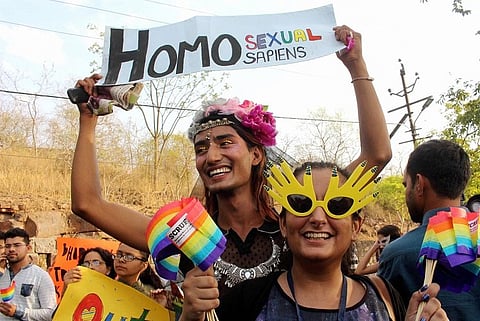

As the Supreme Court on Tuesday heard the petitions challenging the Constitutional validity of Section 377 of the Indian Penal Code, the Indian Psychiatric Society issued a position statement, stated that homosexuality is not, in fact, a psychiatric disorder.
This contentious section criminalises all sexual acts except penile-vaginal intercourse, consent notwithstanding. The section is commonly used to harass the LGBTQ+ community.
Setting the record straight for many who believe that homosexuality is something that can be “cured” because it’s a mental illness, the Indian Psychiatric Society (IPS) said, “This is in line with the position of American Psychiatric Association and The International Classification of Diseases of the World health Organization which removed homosexuality from the list of psychiatric disorders in 1973 and 1992 respectively.”
It further says that “same sex sexuality as a normal variant of human sexuality” and acknowledges that “there is no scientific evidence that sexual orientation can be altered by any treatment”.
The statement adds that the IPS supports the decriminalisation of homosexuality.
In an earlier month-old video, the Indian Psychiatric Society President Dr Ajit Bhide had reiterated the same. He says in the video that the IPS needs to take a “radical stance” that homosexuality is not an illness.
“I think this is a step in the right direction backed by plenty of scientific proof. How does it arise? To oversimplify, a priming process in the brain which determines one’s sexual orientation. Certain individuals are just not cut out to be heterosexual. We don’t need to castigate them, punish them or ostracise them. This liberation is called for and supported by the health fraternity in general and the mental health professional in particular,” he says.
Watch the video here:
In 2009, the Delhi High Court in a landmark progressive judgment had decriminalised homosexuality by scrapping Section 377. In a surprise move, the order was set aside by the Supreme Court in 2013. The apex court later said that it would reconsider the Section’s constitutional validity and referred the case to a constitutional bench.
What has those opposing Section 377 optimistic is another landmark Supreme Court ruling in August 2017, which deemed right to privacy a fundamental right. Four judges in the nine-judge bench then had called for decriminalising Section 377 as it violated the queer community’s right to privacy.
The voices against Section 377 have been steadily on the rise in the past few years. With the pressure on, sources have told several news outlets that the contentious section is likely to be scrapped.